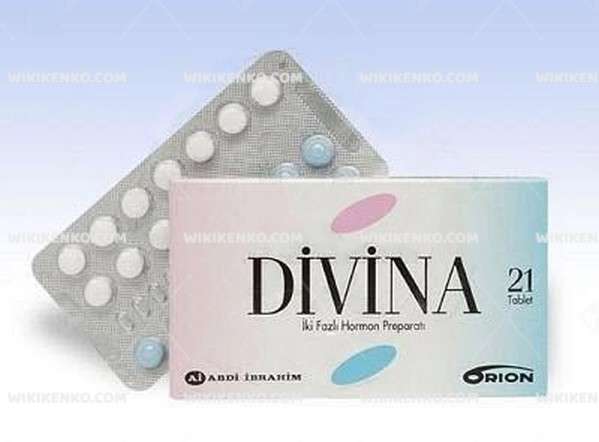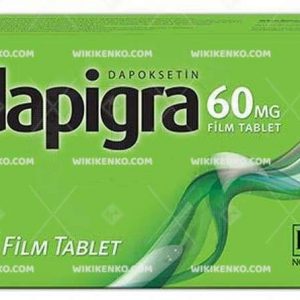Divina Tablet
Divina Tablet stands as a pivotal player in the realm of Hormone Replacement Therapy (HRT). This combined hormone preparation combines two crucial female sex hormones: estrogen and progestogen. In the Turkish market, each Divina Tablet package comprises white tablets containing 2 mg of estradiol valerate and blue tablets containing 2 mg of estradiol valerate and 10 mg of medroxyprogesterone acetate. Let’s delve deeper into the diverse applications and key aspects of this therapeutic offering.
| Dosage form | |
|---|---|
| Pack size | |
| Potency | Combined |
| Manufacturer | |
| Origin | |
| Generic Name (Ingredient) | Each White Tablet In Divina Package Contains 2 Mg Of Estradiol Valerate; Each Blue Tablet Contains 2 Mg Of Estradiol Valerate And 10 Mg Of Medroxyprogesterone Acetate. |
Assuming your emergency circumstances for this product, visit Urgent Quotation page. Besides, for any pharmaceutical questions, please ask us in the comments section.
Description
Divina Tablet is a meticulously formulated HRT option that amalgamates two essential female sex hormones: estrogen and a progestogen. In the Turkish market, it presents in two distinct forms: white tablets, each containing 2 mg of estradiol valerate, and blue tablets, harboring 2 mg of estradiol valerate and 10 mg of medroxyprogesterone acetate. These key components play pivotal roles in alleviating menopausal symptoms and preventing osteoporosis.
Uses of Divina Tablet
- Relief During and After Menopause: Menopause heralds a drop in estrogen levels, often accompanied by troublesome symptoms like sweating and hot flashes. Divina Tablet, in particular, Divina Plus, steps in to offer respite from these post-menopausal discomforts.
- Osteoporosis Prevention: Beyond symptom relief, Divina Tablet plays a vital role in safeguarding bone health. Some women face the risk of osteoporosis post-menopause, making Divina an invaluable option for those with an elevated risk of fractures when other medications are unsuitable.
The Art of Administration
Divina Tablet follows a unique regimen that mimics the two phases of the human menstrual cycle. It involves an 11-day estrogen phase (white tablet) followed by a 10-day combined estrogen-progestin phase (blue tablet). This 21-day treatment cycle culminates in a 7-day drug-free period, during which withdrawal bleeding may occur. This structured approach ensures comprehensive hormone replacement.
Precautions
Before initiating or continuing Divina Tablet treatment, a thorough evaluation of your medical history, including your family’s medical background, is imperative. This process is complemented by a comprehensive medical and gynecological examination, including breast examination. Once treatment commences, regular medical check-ups, preferably at least once a year, become integral in monitoring your health.
Side Effects: Unmasking the Possibilities
While Divina Tablet is designed to provide relief, it’s essential to be aware of potential side effects. Common side effects may include:
- Nausea
- Upset stomach
- Headache
- Sleeplessness
- Increased heart rate
It’s worth noting that the occurrence of these side effects varies among individuals, and not everyone may experience them. In the event that you do, consulting your healthcare provider is crucial for guidance and management.
How Long Does Divina Tablet Take to Work?
The timeline for experiencing the full benefits of Divina Tablet can vary from person to person, contingent upon individual factors and the specific condition being treated. As a hormone replacement therapy, it may take several weeks to a month to observe the comprehensive effects. However, some menopausal symptoms, like hot flashes, might witness relief sooner. It’s essential to acknowledge that the body’s response to medication is unique to each individual. Should any concerns regarding Divina Tablet’s efficacy arise, consulting your healthcare provider is the recommended course of action.
Food or Drug Interactions
While Divina Tablet does not explicitly specify food interactions, it’s vital to recognize that numerous medications can interact with certain foods, beverages, or over-the-counter drugs. These interactions have the potential to influence the efficacy of your medication, escalate unexpected side effects, or even impact the blood levels and toxicity of specific drugs. For example, certain medications may interact with foods, like grapefruit juice, by altering the enzymes responsible for drug metabolism in the liver. This can lead to elevated drug levels and potential toxicity.
Moreover, your existing medical condition can also influence how a drug functions. For instance, over-the-counter oral decongestants may elevate blood pressure and pose risks for individuals with hypertension.
For a comprehensive understanding of potential interactions, it’s prudent to engage in a dialogue with your healthcare provider or pharmacist. Their expertise can offer tailored guidance based on your unique circumstances and concurrent medications.
Pregnancy
It’s important to emphasize that Divina Tablet is primarily intended for women seeking relief from menopausal symptoms and osteoporosis prevention in the post-menopausal phase. As such, it is not designed for use during pregnancy. If you are pregnant, planning to conceive, or currently breastfeeding, it is paramount to consult with your healthcare provider before embarking on any new medication regimen. Such consultations are essential for assessing potential risks to both you and your baby.
Additional Insights
To provide clarity, it’s essential to note that Divina Tablet is not a birth control pill and its usage among women over 65 years old is limited. Furthermore, Hormone Replacement Therapy, including Divina Tablet, carries inherent risks that necessitate thoughtful consideration when contemplating initiation or continuation of treatment.
At a glance
| Property | Details |
|---|---|
| Composition | – White tablet: 2 mg estradiol valerate – Blue tablet: 2 mg estradiol valerate + 10 mg medroxyprogesterone acetate |
| Uses | – Relief during and after menopause – Osteoporosis prevention |
| Administration | – 11-day estrogen phase (white tablet) – 10-day estrogen-progestin phase (blue tablet) – 7-day drug-free period (withdrawal bleeding may occur) |
| Precautions | – Comprehensive medical and gynecological examination – Regular medical check-ups (at least annually) |
| Side Effects | – Nausea – Upset stomach – Headache – Sleeplessness – Increased heart rate |
| Pregnancy | Not intended for use during pregnancy; consult with healthcare provider if pregnant or planning pregnancy |
| Additional Information | – Not a birth control pill – Limited usage among women over 65 years old – HRT carries inherent risks |
Conclusion
Divina Tablet emerges as a vital ally in women’s health, addressing the nuanced challenges of menopause and osteoporosis prevention. Its distinctive regimen and composition offer a comprehensive approach to hormone replacement therapy. However, women embarking on this journey should proceed with awareness, embracing regular check-ups and open communication with healthcare providers. In the realm of women’s well-being, Divina Tablet stands as a beacon of relief and empowerment, emphasizing the importance of informed choices and holistic health management.
Use the form below to report an error
Please answer the questions as thoroughly and accurately as possible. Your answers will help us better understand what kind of mistakes happen, why and where they happen, and in the end the purpose is to build a better archive to guide researchers and professionals around the world.
The information on this page is not intended to be a substitute for professional medical advice, diagnosis, or treatment. always seek the advice for your physician or another qualified health provider with any questions you may have regarding a medical condition. Always remember to
- Ask your own doctor for medical advice.
- Names, brands, and dosage may differ between countries.
- When not feeling well, or experiencing side effects always contact your own doctor.
Cyberchondria
The truth is that when we’re sick, or worried about getting sick, the internet won’t help.
According to Wikipedia, cyberchondria is a mental disorder consisting in the desire to independently make a diagnosis based on the symptoms of diseases described on Internet sites.
Why you can't look for symptoms on the Internet
If diagnoses could be made simply from a textbook or an article on a website, we would all be doctors and treat ourselves. Nothing can replace the experience and knowledge of specially trained people. As in any field, in medicine there are unscrupulous specialists, differences of opinion, inaccurate diagnoses and incorrect test results.






Reviews
There are no reviews yet.